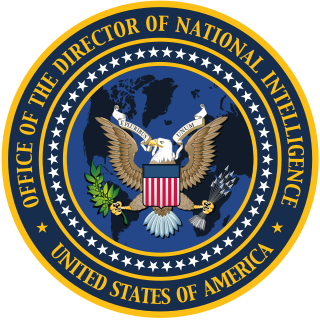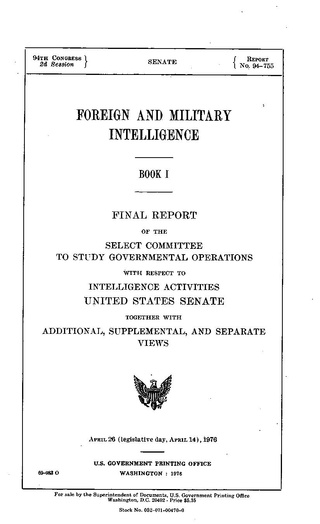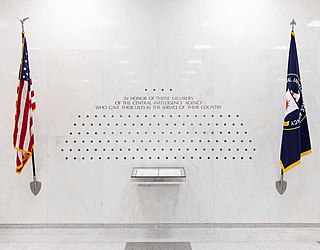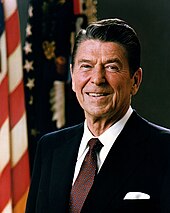
The director of national intelligence (DNI) is a senior cabinet-level United States government official, required by the Intelligence Reform and Terrorism Prevention Act of 2004 to serve as executive head of the United States Intelligence Community (IC) and to direct and oversee the National Intelligence Program (NIP). All IC agencies report directly to the DNI. The DNI also serves, upon invitation, as an advisor to the president of the United States, the National Security Council and the Homeland Security Council on all intelligence matters. The DNI, supported by the Office of the Director of National Intelligence (ODNI), produces the President's Daily Brief (PDB), a classified document including intelligence from all IC agencies, handed each morning to the president of the United States.

The United States Intelligence Community (IC) is a group of separate U.S. federal government intelligence agencies and subordinate organizations that work both separately and collectively to conduct intelligence activities which support the foreign policy and national security interests of the United States. Member organizations of the IC include intelligence agencies, military intelligence, and civilian intelligence and analysis offices within federal executive departments.

The Church Committee was a US Senate select committee in 1975 that investigated abuses by the Central Intelligence Agency (CIA), National Security Agency (NSA), Federal Bureau of Investigation (FBI), and the Internal Revenue Service (IRS). Chaired by Idaho Senator Frank Church (D-ID), the committee was part of a series of investigations into intelligence abuses in 1975, dubbed the "Year of Intelligence", including its House counterpart, the Pike Committee, and the presidential Rockefeller Commission. The committee's efforts led to the establishment of the permanent US Senate Select Committee on Intelligence.

On 8 March 1985, a car bomb exploded between 9 and 45 metres from the house of Shia cleric Sayyed Mohammad Hussein Fadlallah in Beirut, Lebanon, in a failed assassination attempt by a Lebanese counter-terrorism unit linked to the Central Intelligence Agency. The bombing killed 80 people and injured 200, almost all civilians.

The United States President's Commission on CIA Activities within the United States was ordained by President Gerald Ford in 1975 to investigate the activities of the Central Intelligence Agency and other intelligence agencies within the United States. The Presidential Commission was led by Vice President Nelson Rockefeller, from whom it gained the nickname the Rockefeller Commission.

The Office of Intelligence and Analysis (OIA) is a component of the United States Department of the Treasury responsible for the receipt, analysis, collation, and dissemination of foreign intelligence and counterintelligence information related to the operation and responsibilities of the Treasury Department.
The Privacy and Civil Liberties Oversight Board (PCLOB) is an independent agency within the executive branch of the United States government, established by Congress in 2004 to advise the President and other senior executive branch officials to ensure that concerns with respect to privacy and civil liberties in the United States are appropriately considered in the development and implementation of all laws, regulations, and executive branch policies related to terrorism.
This is a list of activities ostensibly carried out by the U.S. Central Intelligence Agency (CIA) within Pakistan. It has been alleged by such authors as Ahmed Rashid that the CIA and ISI have been waging a clandestine war. The Afghan Taliban—with whom the United States was officially in conflict—was headquartered in Pakistan's Federally Administered Tribal Areas during the war and according to some reports is largely funded by the ISI. The Pakistani government denies this.
Executive Order 13470 was issued by U.S. President President Bush on July 30, 2008. It amended Executive Order 12333 to strengthen the role of the Director of National Intelligence.
Executive Order 13355 is a United States Presidential executive order signed on August 27, 2004, by President George W. Bush. Its goal was "Strengthened Management of the Intelligence Community". It supplemented and partially superseded Executive Order 12333, signed in 1981 by President Ronald Reagan, and was in turn partially supplemented and superseded by Executive Order 13470 in 2008.

Executive Order 11905 is a United States Presidential Executive Order signed on February 18, 1976, by President Gerald R. Ford in an effort to reform the United States Intelligence Community, improve oversight on foreign intelligence activities, and ban political assassination. Much of this EO would be changed or strengthened by Jimmy Carter's Executive Order 12036 in 1978.

Executive Order 12036 is a United States Presidential Executive Order signed on January 24, 1978, by President Jimmy Carter that imposed restrictions on and reformed the U.S. Intelligence Community along with further banning indirect U.S. involvement in assassinations. The EO was designed to strengthen and expand Executive Order 11905, which was originally signed by Gerald R. Ford in 1976.
The Assistant to the Secretary of Defense for Intelligence Oversight, formerly the Senior Intelligence Oversight Official, or SIOO, was responsible to the U.S. Secretary of Defense for the independent oversight of all intelligence, counterintelligence, and intelligence-related activities in the Department of Defense. The organization's charter is articulated in DoD Directive 5148.13. The ATSD(IO) ensures that all activities performed by intelligence, counterintelligence, and intelligence related units are conducted in accordance with Federal law, Executive Orders, DoD directives, regulations and policies. In July 2014, this position was retitled as the Department of Defense Senior Intelligence Oversight Official, after the position was aligned within the Office of the Deputy Chief Management Officer (DCMO). On January 11, 2021, the Acting Secretary of Defense directed the "re-establishment" of the ATSD(IO) office and title. On September 1, 2021, the Department of Defense disestablished the ATSD (IO) and subordinated the DoD Intelligence Oversight function under a new Assistant to the Secretary of Defense for Privacy, Civil Liberties & Transparency, ASTD (PCLT).
The Boren-McCurdy intelligence reform proposals were two legislative proposals from Senator David Boren and Representative Dave McCurdy in 1992. Both pieces of legislation proposed the creation of a National Intelligence Director. Neither bill passed into law.
The Information Sharing Environment (ISE) was established by the United States Intelligence Reform and Terrorism Prevention Act of 2004. Under Section 1016 of IRTPA, the Program Manager for the Information Sharing Environment (PM-ISE) was granted government wide authority to plan for, oversee the implementation of, and manage the ISE.

The United States' Central Intelligence Agency (CIA) made numerous unsuccessful attempts to assassinate Cuban leader Fidel Castro. There were also attempts by Cuban exiles, sometimes in cooperation with the CIA. The 1975 Church Committee claimed eight proven CIA assassination attempts between 1960 and 1965. In 1976, President Gerald Ford issued an Executive Order banning political assassinations. In 2006, Fabián Escalante, former chief of Cuba's counterintelligence, stated that there had been 634 assassination schemes or attempts. The last known plot to assassinate Castro was by Cuban exiles in 2000.

John Napier Tye is a former official of the U.S. State Department who came forward in 2014 as a whistleblower seeking to publicize certain electronic surveillance practices of the U.S. government under Executive Order 12333. He later co-founded a legal organization, Whistleblower Aid, intended to help whistleblowers in multiple sectors forward their concerns without incurring legal liability.

The United States Central Intelligence Agency (CIA) dates from September 18, 1947, when President Harry S. Truman signed the National Security Act of 1947 into law. A major impetus that has been cited over the years for the creation of the CIA was the unforeseen attack on Pearl Harbor, but whatever Pearl Harbor's role, at the close of World War II government circles identified a need for a group to coordinate government intelligence efforts, and the Federal Bureau of Investigation (FBI), the State Department, the War Department, and even the Post Office were all jockeying for that new power.











